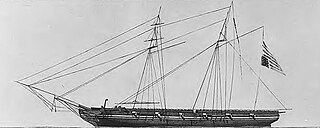Register or registration may refer to:

The United States Coast Guard (USCG) is the maritime security, search and rescue, and law enforcement service branch of the United States Armed Forces and one of the country's eight uniformed services. The service is a maritime, military, multi-mission service unique among the United States military branches for having a maritime law enforcement mission with jurisdiction in both domestic and international waters and a federal regulatory agency mission as part of its duties. It is the largest coast guard in the world, rivaling the capabilities and size of most navies.
In criminal and civil law, strict liability is a standard of liability under which a person is legally responsible for the consequences flowing from an activity even in the absence of fault or criminal intent on the part of the defendant.
In law, conveyancing is the transfer of legal title of real property from one person to another, or the granting of an encumbrance such as a mortgage or a lien. A typical conveyancing transaction has two major phases: the exchange of contracts and completion.

Due diligence is the investigation or exercise of care that a reasonable business or person is normally expected to take before entering into an agreement or contract with another party or an act with a certain standard of care.
Law is a system of rules that regulate behavior.

The United States Revenue Cutter Service was established by an act of Congress on 4 August 1790 as the Revenue-Marine upon the recommendation of Secretary of the Treasury Alexander Hamilton to serve as an armed customs enforcement service. As time passed, the service gradually gained missions either voluntarily or by legislation, including those of a military nature. It was generally referred to as the Revenue-Marine until 31 July 1894, when it was officially renamed the Revenue Cutter Service. The Revenue Cutter Service operated under the authority of the U.S. Department of the Treasury. On 28 January 1915, the service was merged by an act of Congress with the United States Life-Saving Service to form the United States Coast Guard.

Offshore radio is radio broadcasting from ships or fixed maritime structures. Offshore broadcasters are usually unlicensed but transmissions are legal in international waters. This is in contrast to unlicensed broadcasting on land or within a nation's territorial waters, which is usually unlawful.
A rose is a perennial plant of the genus Rosa, or the flower it bears.

Dredging is the excavation of material from a water environment. Possible reasons for dredging include improving existing water features; reshaping land and water features to alter drainage, navigability, and commercial use; constructing dams, dikes, and other controls for streams and shorelines; and recovering valuable mineral deposits or marine life having commercial value. In all but a few situations the excavation is undertaken by a specialist floating plant, known as a dredger.
Defender(s) or The Defender(s) may refer to:
Hypothec, sometimes tacit hypothec, is a term used in civil law systems or mixed legal systems to refer to a registered non-possessory real security over real estate, but under some jurisdictions it may sometimes also denote security on other collaterals such as securities, intellectual property rights or corporeal movable property, either ships only as opposed to other movables covered by a different type of right (pledge) in the legal systems of some countries, or any movables in legal systems of other countries. Common law has two main equivalents to the term: mortgages and non-possessory liens.
A walrus is a large, flippered marine mammal.

Know Your Customer (KYC) guidelines and regulations in financial services require professionals to verify the identity, suitability, and risks involved with maintaining a business relationship with a customer. The procedures fit within the broader scope of anti-money laundering (AML) and counter terrorism financing (CTF) regulations.

Diligence is a term in Scots Law with no single definition, but is commonly used to describe debt collection and debt recovery proceedings against a debtor by a creditor in Scottish courts. The law of diligence is part of the law of actions in Scots private law. Accordingly, it is within the devolved competence of the Scottish Parliament.

The West Indies Anti-Piracy Operations were a series of military operations and engagements undertaken by the United States Navy against pirates in and around the Antilles. Between 1814 and 1825, the American West Indies Squadron hunted pirates on both sea and land, primarily around Cuba and Puerto Rico. After the capture of Roberto Cofresi in 1825, acts of piracy became rare, and the operation was considered a success, although limited occurrences went on until slightly after the start of the 20th century.
La Diligence can refer to:
The lion is a big cat of the species Panthera leo that inhabits the African continent and one forest in India.
This page is based on this
Wikipedia article Text is available under the
CC BY-SA 4.0 license; additional terms may apply.
Images, videos and audio are available under their respective licenses.







